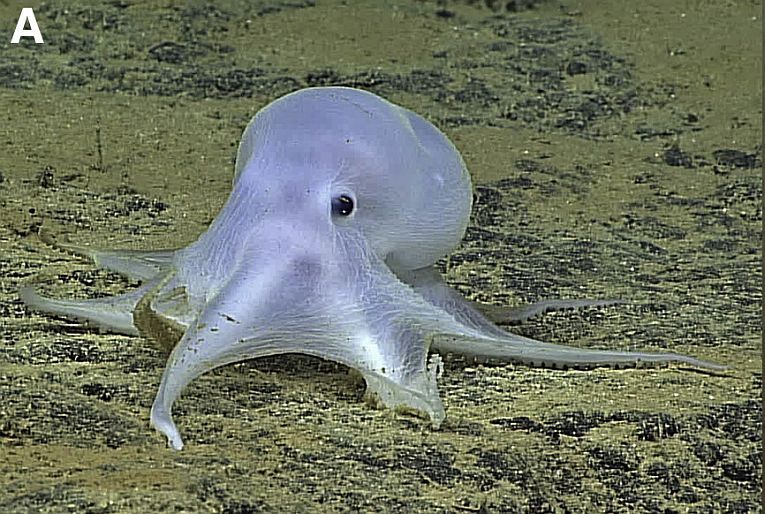The octopus is a familiar, often-eaten inhabitant of our rocky shore. Other members of the octopod family, however, live far from that habitat, in distant and various locations, from pelagic situations around the oceans to deep-sea habitats that have never been imagined, never mind discovered before.
Autun Purser, Yann Marcon, Henk-Jan T. Hoving, Michael Vecchione, Uwe Piatkowski, Deborah Eason, Hartmut Bluhm and Antje Boetius from German Institutions such as the Alfred Wegener Institute in Bremerhaven and a couple of US Universities present a really interesting paper in Current Biology, entitled Association of deep-sea incirrate octopods with manganese crusts and nodule fields in the Pacific Ocean.
Species haven't yet been determined for these new discoveries around the Necker and the Ka'ena Ridges (south of Hawaii) and the Peru Basin (close to Easter Island) but the genus Vulcanoctopus seems to be favourite. These benthic octopuses are the deepest known habitats, around seafloor crust and manganese nodules, similar to the plateaux habitats of Graneledone octopods in the NE Pacific. Sponges seem to be important to these species, especially for depositing their egg stalks, as they spend years brooding their eggs here, with low temperatures affecting development times. Other cephalopod species such as the sepiolid, Rossia mollicella also use sponges, but this is a first for octopods.
The Peru Basin and many others have been marked for potential metal-rich crust removal by exploitative commercial interests. The lucrative trade in many metals, as well as the obvious manganese, is encouraged by their current heavy use in phones and other electronics. The chemistry of their long-term formation in this deep-sea habitat has long been studied with a view to harvesting.
What happens to the ploughed-up sponges and the whole ecosystem associated with them is of interest, but one 7-year study concluded they would not regenerate at all within that time interval. The time taken to brood eggs, or even to grow, at the temperatures down there is equalled by long life histories and consequently, limited capacity for reproduction.
This unexpectedly-large octopod population and their biodiverse habitat remains to be investigated. What is sure is that our previous ignorant use of the seas for dumping waste and removing key species will quite possibly be extended into simple ploughing up of huge areas without any consideration of the consequences. It is not only about octopods; how will other ecosystems that affect ourselves be affected?
An example of what the deep seas contain, this is the OMZ ecosystem, where the lack of oxygen and any light has allowed cephalopods such the amazing Vampiroteuthis infernalis to evolve. WOW!










